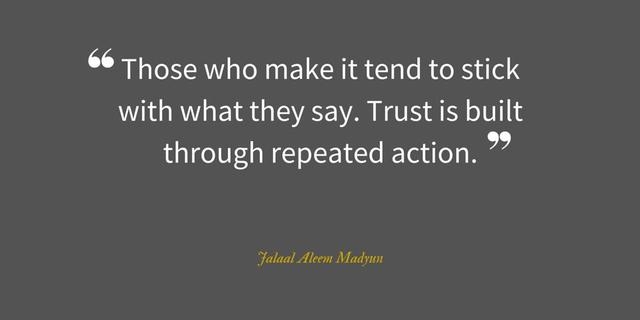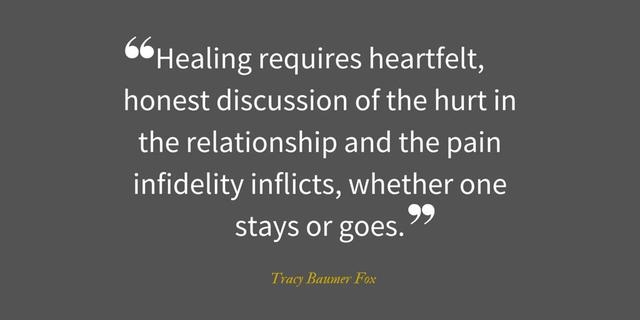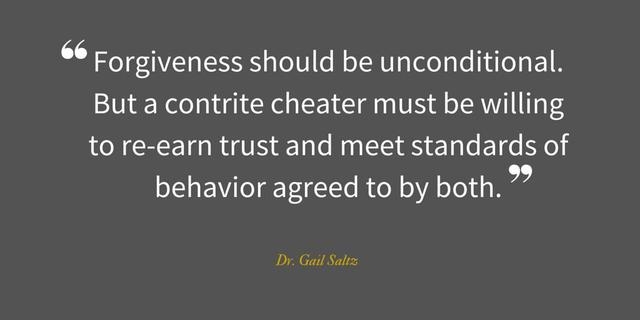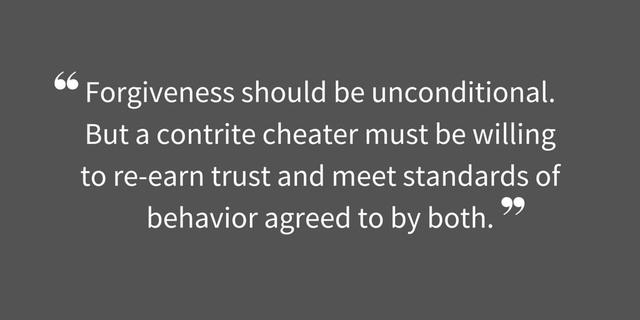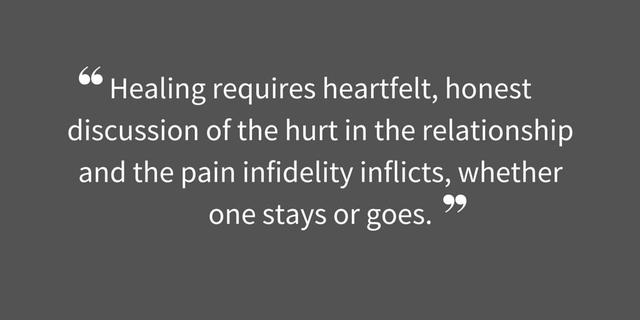Should you forgive your cheating spouse?
In the face of a spouse’s infidelity, an individual has two choices: walk away or try to save the relationship. Danine Manette did both, though not at the same time.
In 1998, Manette was exhausted by a day job, two very young children and all the housework and chores they involved. Her hectic schedule seldom included her husband, who worked nights, then slept and often recuperated by watching TV and playing ball with his friends. They had little time together or real intimacy.
She didn’t want flowers or candy. She wanted him to pick up a mop. She resented his carefree home life. He resented her lack of attention. Years later, she recognized his affair as a symptom of other problems in their marriage. But she wasn’t that sanguine then: When he cheated on her, she left.
As Manette, who lives in Berkeley, California, tells the story, she pauses periodically to fill in the bigger picture she couldn’t see at the time. She got a new apartment and launched a new life, arranging to pass their children back and forth with as little personal contact with him as possible. She resented every breath he took.
She’s 47 now. She was 31 when he cheated. Two years later they started over — together. The marriage no longer seemed too broken to fix, though they took it slow. They have since had another child, now 9.
Of all couples in which one spouse has cheated, Manette and her husband are among the one-third who successfully work through the infidelity and stay together.
There are no absolute numbers for infidelity, though educated guesses abound. Statistic Brain guesstimates that in 41 percent of marriages a spouse cheats, at least emotionally. The National Science Foundation’s 2010 General Social Survey put the number of men who had been physically unfaithful at least once at 19 percent, the number of women at 14 percent. Other surveys say as many as one-fourth of men and one-fifth of women have broken the seventh commandment by committing adultery. A website for cheaters boasts 16 million members, although there’s no way to tell if they’ve all actually been unfaithful.
After a partner cheats, the couple must decide whether to fight for the marriage or end it — a decision that’s likely more nuanced than it feels in that first moment of discovering infidelity, experts said. There are pluses and minuses with either decision and it’s especially complicated in families with children.
Although it can be very painful, walking away after a partner cheats does not require a road map, experts say. Working it out, however, just might.
Stay or go?
“Infidelity is not a small deal. Divorce is not a small deal either,” said Dr. Gail Saltz, associate professor of psychiatry at the New York Presbyterian Hospital Weill-Cornell School of Medicine and a private clinician in Manhattan. “Everyone today wants to hear everything they do is OK and fixable. That is just not so. You have to make hard decisions. You have to do a lot of work.”
For one thing, finances take a big hit in divorce, she said — as much as a 60 percent drop.
That’s nothing compared to the nosedive in trust. It’s natural for the person who was betrayed to wonder what else isn’t true in a relationship, said Jeff Menzise, a clinical psychologist in the Washington, D.C., area. “Did he or she even really love me?” a deceived spouse may ask.
If couples stay together, dating and relationship coach Jalaal Aleem Madyun of Minneapolis said they must follow certain steps to survive infidelity, beginning with slowing down to feel one’s emotions without making hasty decisions about how to react.
There’s no hope of reconciliation until both parties understand the other’s feelings, too, said Tracy Baumer Fox, a certified life coach from Darien, Connecticut, who uses biblical principles to help couples reconcile. She’s the author of a devotional book, “Having a Heart for God.” “I coach a lot of women and men who have stepped out of their marriage, and they don’t do it to be cruel and they don’t really even do it intentionally. They do it because there’s something missing in their lives and they aren’t getting their needs filled at home.”
Healing requires heartfelt, honest discussion of the hurt in the relationship and the pain infidelity inflicts, whether one stays or goes, she said.
When kids are involved, the benefit of staying together is “invaluable” to a couple’s children, Fox said, as long as both parties are respectful and dedicated to recovery. She listed reasons: Children in intact families are physically and emotionally healthier. They are more likely to attend college and are less likely to be sexually abused, use alcohol or commit crimes. They have decreased risk of divorce themselves and are less likely to become pregnant or impregnate someone as a teen.
The very existence of children increases the urgency to make a marriage work after infidelity, says Madyun. That’s usually, but not always, a good thing. Parents sometimes reconnect prematurely to try to get things back to normal for the kids.
Fox likes Dr. Phil’s concept of “owning your way out of your marriage.” That means trying everything to preserve family before you leave a marriage, absent abuse. “Statistics prove that couples who stay together after any big betrayal — and it doesn’t have to be infidelity — were most often very happy they did,” she said. Absent that effort, the same problems crop up repeatedly, she added.
“Those who make it tend to stick with what they say. Trust is built through repeated action,” warned Madyun. “The things that are said and the things that are agreed to need to stay true over time.”
Couples without kids may find it easier to call it quits, Menzise said.
Parents who decide to split must “work really hard to have a healthy divorce for the children,” said Saltz. That means being calm and not putting the other person down, “no matter how disgusting you find what your partner did. Your kids need a good parent.” Don’t take that away from them.
Too many judges
Mired in the shock and pain of betrayal, it’s natural to tell everyone you’re close to what happened. That’s a dangerous choice if reconciliation is to be a possibility.
“Once you disclose, it creates a hostile environment for the relationship,” Madyun said, because then people who care about you are unhappy with your partner. And they don’t just judge the cheating spouse, but how the person who was cheated on handled it, too.
“You have external pressure now, people leaning on you with their own protective instincts,” said Menzise. Still, he thinks it’s a good idea to talk to someone you trust and respect. Just be careful. “What I do not advocate is discussing it with quote-unquote friends, unless you’re absolutely sure of that individual’s loyalty and that they have your interests at heart.”
He also suggests considering someone’s life in general before sharing with that person. “It’s difficult to get good relationship advice from people who have stressful relationships.”
A professional counselor or coach may be the best option. Relationships seldom get back to what they were before betrayal, these experts agreed. It’s better to stay committed from the beginning.
Forgiving
Of three types of forgiveness, only direct forgiveness helps, said Madyun. Indirect — sweeping the issue under the rug — and conditional — which comes with strings attached — don’t work.
Forgiveness doesn’t mean forgetting, Saltz said. But you cannot “forever swing your partner by that noose” and work things out. “It’s not tenable to stay married that way.”
“You decide if you’re truly going to forgive,” said Madyun. “Then if you’re going to continue, you can address what makes you feel comfortable about being able to proceed.”
Forgiveness should be unconditional. But a contrite cheater must be willing to re-earn trust and meet standards of behavior agreed to by both. Saltz said it must always include no contact with the partner in infidelity. If that means changing jobs because you cheated with someone at work — a spectacularly bad idea anyway, she added — then so be it.
While she was still raging and working through things, Manette, a criminal investigator, wrote a book about infidelity called “Ultimate Betrayal: Recognizing, Uncovering and Dealing with Infidelity.” It was part of her own reconciliation process, she said.Manette and her husband set a standard that included banishing secrets. “You have to be ready to open your life,” Manette said of her husband’s journey. “Every time a story checks out, it increases your credibility. Every time you had any interaction with her, however innocently, and didn’t tell me, you lose 1,000 points.”




